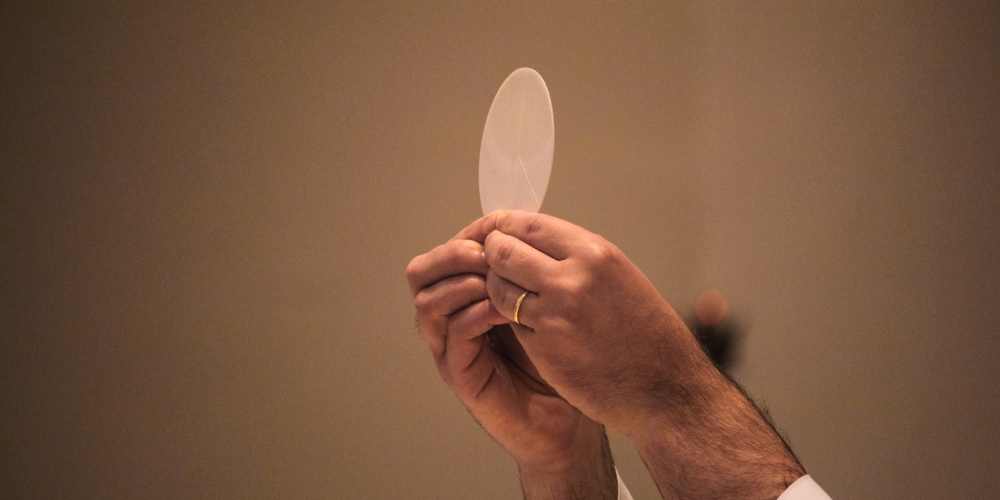Can. 528 §1. A pastor is obliged to make provision so that the word of God is proclaimed in its entirety to those living in the parish; for this reason, he is to take care that the lay members of the Christian faithful are instructed in the truths of the faith, especially by giving a homily on Sundays and holy days of obligation and by offering catechetical instruction. He is to foster works through which the spirit of the gospel is promoted, even in what pertains to social justice. He is to have particular care for the Catholic education of children and youth. He is to make every effort, even with the collaboration of the Christian faithful, so that the message of the gospel comes also to those who have ceased the practice of their religion or do not profess the true faith.
§2. The pastor is to see to it that the Most Holy Eucharist is the center of the parish assembly of the faithful.
He is to work so that the Christian faithful are nourished through the devout celebration of the sacraments and, in a special way, that they frequently approach the sacraments of the Most Holy Eucharist and penance. He is also to endeavor that they are led to practice prayer even as families and take part consciously and actively in the sacred liturgy which, under the authority of the diocesan bishop, the pastor must direct in his own parish and is bound to watch over so that no abuses creep in.
Can. 529 §1. In order to fulfill his office diligently, a pastor is to strive to know the faithful entrusted to his care.
Therefore he is to visit families, sharing especially in the cares, anxieties, and griefs of the faithful, strengthening them in the Lord, and prudently correcting them if they are failing in certain areas. With generous love he is to help the sick, particularly those close to death, by refreshing them solicitously with the sacraments and commending their souls to God; with particular diligence he is to seek out the poor, the afflicted, the lonely, those exiled from their country, and similarly those weighed down by special difficulties. He is to work so that spouses and parents are supported in fulfilling their proper duties and is to foster growth of Christian life in the family.
§2. A pastor is to recognize and promote the proper part which the lay members of the Christian faithful have in the mission of the Church, by fostering their associations for the purposes of religion. He is to cooperate with his own bishop and the presbyterium of the diocese, also working so that the faithful have concern for parochial communion, consider themselves members of the diocese and of the universal Church, and participate in and sustain efforts to promote this same communion.
Can. 530 The following functions are especially entrusted to a pastor:
1/ the administration of baptism;
2/ the administration of the sacrament of confirmation to those who are in danger of death, according to the norm of can. 883, n. 3;
3/ the administration of Viaticum and of the anointing of the sick, without prejudice to the prescript of can. 1003, §§2 and 3, and the imparting of the apostolic blessing;
4/ the assistance at marriages and the nuptial blessing;
5/ the performance of funeral rites;
6/ the blessing of the baptismal font at Easter time, the leading of processions outside the church, and solemn blessings outside the church;
7/ the more solemn eucharistic celebration on Sundays and holy days of obligation.
Can. 531 Although another person has performed a certain parochial function, that person is to put the offerings received from the Christian faithful on that occasion in the parochial account, unless in the case of voluntary openings the contrary intention of the donor is certain. The diocesan bishop, after having heard the presbyteral council, is competent to establish prescripts which provide for the allocation of these openings and the remuneration of clerics fulfilling the same function.
Can. 532 In all juridic affairs the pastor represents the parish according to the norm of law. He is to take care that the goods of the parish are administered according to the norm of cann. 1281-1288.
Can. 533 §1. A pastor is obliged to reside in a rectory near the church. Nevertheless, in particular cases and if there is a just cause, the local ordinary can permit him to reside elsewhere, especially in a house shared by several presbyters, provided that the performance of parochial functions is properly and suitably provided for.
§2. Unless there is a grave reason to the contrary, a pastor is permitted to be absent from the parish each year for vacation for at most one continuous or interrupted month; those days which the pastor spends once a year in spiritual retreat are not computed in the time of vacation. In order to be absent from the parish for more than a week, however, a pastor is bound to inform the local ordinary.
§3. It is for the diocesan bishop to establish norms which see to it that during the absence of the pastor, a priest endowed with the necessary faculties provides for the care of the parish.
Can. 534 §1. After a pastor has taken possession of his parish, he is obliged to apply a Mass for the people entrusted to him on each Sunday and holy day of obligation in his diocese. If he is legitimately impeded from this celebration, however, he is to apply it on the same days through another or on other days himself.
§2. A pastor who has the care of several parishes is bound to apply only one Mass for the entire people entrusted to him on the days mentioned in §1.
§3. A pastor who has not satisfied the obligation mentioned in §§1 and 2 is to apply as soon as possible as many Masses for the people as he has omitted.
Can. 535 §1. Each parish is to have parochial registers, that is, those of baptisms, marriages, deaths, and others as prescribed by the conference of bishops or the diocesan bishop. The pastor is to see to it that these registers are accurately inscribed and carefully preserved.
§2. In the baptismal register are also to be noted confirmation and those things which pertain to the canonical status of the Christian faithful by reason of marriage, without prejudice to the prescript of can. 1133, of adoption, of the reception of sacred orders, of perpetual profession made in a religious institute, and of change of rite. These notations are always to be noted on a baptismal certificate.
§3. Each parish is to have its own seal. Documents regarding the canonical status of the Christian faithful and all acts which can have juridic importance are to be signed by the pastor or his delegate and sealed with the parochial seal.
§4. In each parish there is to be a storage area, or archive, in which the parochial registers are protected along with letters of bishops and other documents which are to be preserved for reason of necessity or advantage. The pastor is to take care that all of these things, which are to be inspected by the diocesan bishop or his delegate at the time of visitation or at some other opportune time, do not come into the hands of outsiders.
§5. Older parochial registers are also to be carefully protected according to the prescripts of particular law.
Can. 536 §1. If the diocesan bishop judges it opportune after he has heard the presbyteral council, a pastoral council is to be established in each parish, over which the pastor presides and in which the Christian faithful, together with those who share in pastoral care by virtue of their office in the parish, assist in fostering pastoral activity.
§2. A pastoral council possesses a consultative vote only and is governed by the norms established by the diocesan bishop.
Can. 537 In each parish there is to be a finance council which is governed, in addition to universal law, by norms issued by the diocesan bishop and in which the Christian faithful, selected according to these same norms, are to assist the pastor in the administration of the goods of the parish, without prejudice to the prescript of can. 532.




